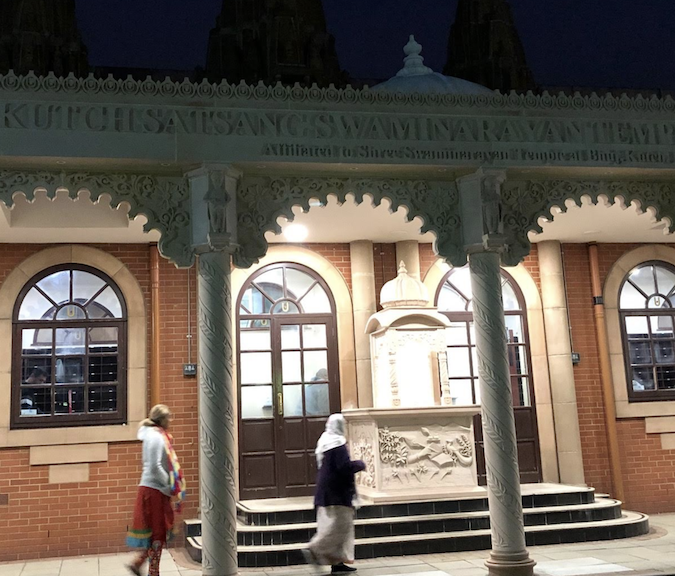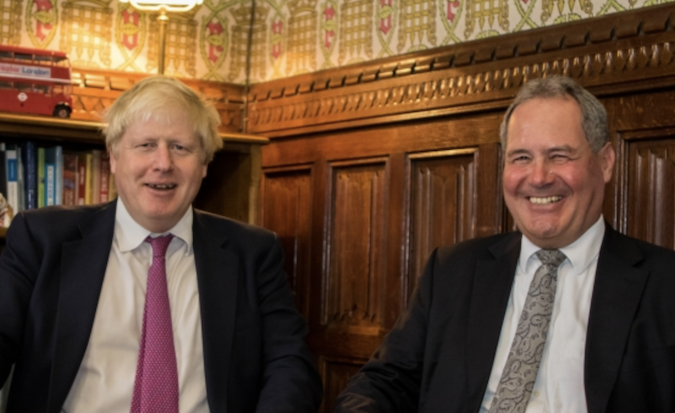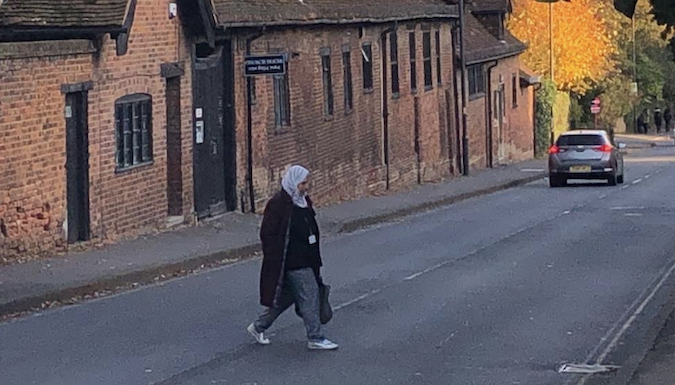Harrow is a beacon of multiculturalism: one of a handful of local authority areas where ethnic minorities are in the majority, and in the top two nationally for religious diversity. It has the UK’s biggest Hindu population at over 25 per cent, the sixth largest Jewish population, centred in Stanmore, and a significant south Asian Muslim minority. A few weekends ago, one of Harrow Leisure Centre’s sport halls was used as a polling station in the Romanian election, while an Indian wedding show took place next door.
In Harrow East parliamentary constituency, where Conservative Bob Blackman commands a slim majority of 1,757, Labour candidate, Harrow councillor and director of Harrow Law Centre Pamela Fitzpatrick speaks passionately about addressing social injustices locally. She lists “one of the highest rates of low pay in London and many in zero hours contracts, the lowest level of council housing of any borough in London, poorer people reliant on a high cost, poor quality private rented sector, cuts to police and youth services and a massive spike in shootings and stabbings”.
According to fans Sally Chandler, a local activist, and Jackie Schneider, Labour’s candidate for Wimbledon, Fitzpatrick, personally backed by shadow chancellor John McDonnell, is “a breath of fresh air” who enjoys “love and respect for her work [at the Law Centre] supporting people who are under the radar”. But to unseat Blackman, Fitzpatrick needs to tackle some uncomfortable issues around community relations, which she would rather not talk about in her determinedly positive campaign, while facing critics within her own party who accuse her of conspiracist thinking and jeopardising community relations.
One embarrassing moment came when a canvasser for Fitzpatrick reportedly laughed at a female Stanmore resident who said she was worried about Labour anti-semitism and wouldn’t vote for the party while Jeremy Corbyn is its leader. The resident was the mother-in-law of Adam Langleben, former Barnet Labour councillor and arch-critic of Corbyn’s conduct over anti-semitism.
Fitzpatrick was quickly on Langleben’s doorstep to apologise. Afterwards, the candidate said her campaign would be “investigating the incident further to make sure nothing like this ever happens again.” But that might not be enough for Navin Shah, Labour London Assembly Member for Brent & Harrow and the party’s Harrow East candidate in 2017, who tweeted that the incident should make Fitzpatrick feel “truly ashamed”, or for one of Fitzpatrick’s Labour council colleagues, who wants the canvassers reported to the Labour Party’s compliance unit.
Fitzpatrick’s critics recall her absence from the room in 2017 when Harrow Council voted to accept the IHRC definition of anti-Semitism. Fitzpatrick later said this was not deliberate, insisting she supported adopting the definition. “I was and am completely supportive of the motion, and I’m glad it was passed unanimously. I wish I had been able to add my vote in support,” she says. That was followed by the local party’s vote last year, after Fitzpatrick was chosen as its candidate, to affiliate to anti- and non-Zionist group Jewish Voice for Labour (JVL), which is backed by a few Jewish East Harrow members but opposed by a greater number.

JVL’s conviction that communal organisations like the Board of Deputies represent only a minority of British Jews seems anomalous in Stanmore, which “contains Orthodox Jews and non-Orthodox Jews, but it isn’t known as a place where secular Lefty Jews congregate,” says Birkbeck College sociologist Keith Kahn-Harris. Yvonne Lee was one Jewish member to leave the local party: she was made to feel unwelcome, she says, by meetings held on Rosh Hashanah in two successive years and by a member suggesting gentile activists should canvass in Stanmore wearing kippah head-coverings to show their support for the Jewish community.
Fitzpatrick’s campaign also faces a challenge attracting Indian Hindu
voters over events following India’s revocation of Kashmir’s
autonomous status: a perception of foot-dragging by Sadiq Khan over condemning protests outside the Indian High Commission which turned violent, and the passing of a motion at this year’s Labour conference calling for the right of self-determination for Kashmir, which caused a storm. The “ill-conceived, partisan motion… demonstrates my party’s astounding insensitivity” wrote Navin Shah. “The debate, for example one speaker comparing Modi with Hitler, was unbalanced and went unchecked. Indian communities and community organisations are fuming… Diplomatic relations with India are in tatters”.
Hindu nationalist propaganda from India favouring the Conservatives has penetrated the last two UK general elections. With technological advances, what’s new, says Dr Subir Sinha of SOAS, is “the integration between what the community here sees and what [Indian Prime Minister] Narendra Modi’s supporters in India see” and the way that “community leaders, people with OBEs” in supporters’ groups like Overseas Friends of BJP (UK), are involved in circulating the material. Journalist Sunny Hundal has written about the blizzard of WhatsApp messages he gets attacking Labour and backing the Tories, some with doctored images, such as Corbyn performing a Nazi salute.
In Harrow, Labour councillor for Kenton West Ajay Maru says he is still getting eight to ten messages a day: “It’s spreading like fire.” Hindu temples in and around Harrow have reportedly helped amplify the anti-Labour message. One institution refused Sadiq Khan’s request to visit it for Diwali. During the festival of Navaratri, the SKLPC community centre in Northolt (which has many members living in Harrow East) barred Labour Party figures. Maru spoke to SKLPC’s president in Swahili, a language they have in common, to remind him of his duties as the head of a charity.
Fitzpatrick’s campaign points to the letter from Labour Party chair Ian Lavery distancing the party from the conference motion, and canvassers have brought around voters critical of Labour’s stance on Kashmir by moving the conversation on to other issues such as investment in education. But awareness doesn’t translate to easy assurance. Councillor Maru has spoken to Fitzpatrick’s campaign about Kashmir and thinks “they do understand, but I don’t know if they’re able to take it up and say there is a problem”. (By contrast, listen to the conviction of Hounslow Labour group chair Salman Shaheen, explaining why he backs the Labour conference motion by referencing the horrors of Partition on both sides and his family’s flight to Pakistan from the southern Indian city of Mysore: “I feel every bit as much affinity to India as I do Pakistan. My position is about standing up for human rights for all peoples everywhere.”)
There’s an underlying sense among Harrow’s large Gujarati population that they’ve been overlooked and taken for granted by Labour for too long. Last week, Fitzpatrick’s campaign put in a request to visit one of the constituency’s temples, which trustees have been considering. But it seems they feel they don’t know her, whereas Bob Blackman is constantly in one temple or another. British Indians are mystified that there is only one Indian Labour candidate selected for 39 safe seats where MPs aren’t standing again, and no Indian candidates in 100 target seats. Then there’s the fear of some Indian voters – reasonable or not – that they will face the same experience as the Jewish community with Labour. “There are similarities. We should learn from the anti-semitism issue,” says Navin Shah. “Once the situation is inflamed, it can lose control. Parties should have reached out with community leaders and engaged. We have tried and failed.”
The heartache within Labour is played out in Harrow East through the rift with local councillors and the tide of well-intentioned activists from elsewhere who do not know the area. A doorstep conversations session for activists led by young Corbynite school teacher Holly Rigby was held at Harrow Baptist Church last week, shortly before she became embroiled in controversy over her lambasting of the Chief Rabbi. This event was organised by Momentum, not Harrow East Labour. One can’t help thinking more sessions with religious communities, rather than just making use of their buildings, would bolster the campaign.
The irony is that Labour is embroiled in this controversy when the approach of Bob Blackman during his nine years as Harrow East’s MP has been widely criticised for dividing communities. Wrapping himself in Hindu and Jewish causes, he has drawn fury by hosting events in parliament attended by extreme Hindu nationalist Tapan Ghosh – Blackman demurs that he didn’t invite him – sharing and then retracting Islamophobic articles by the likes of Tommy Robinson, and speaking proudly of his opposition to equal marriage.
Blackman inspires admiration even from enemies for his tireless campaigning, and target voters see him as effective (“You can trust him, he can get things done for you” says project manager Nilesh Pankhania in Kenton). But more than one declared Labour supporter alleges that when they have asked him for assistance, their casework seems to have gone to the bottom of the pile.
While Blackman (pictured below, with Boris Johnson) does engage with the local Muslim community – for example, he attended a community Iftar during Ramadan and last week took part in an election podcast with the Huseini Islamic Centre – there is a feeling that they are not a priority compared with his favoured voter groups. He was quoted in a 2015 Jewish Chronicle article as describing himself as a “Chrinjew” – a Christian with Jewish roots and an honorary Hindu”. If you’re from Harrow East’s other major faith community, your exclusion might feel rather pointed.

Blackman’s Labour rival in the 2015 election campaign, Uma Kumaran, said he “managed to drag it into the gutter“. Material circulating in the constituency included a leaflet backing Blackman’s opposition to anti-caste discrimination legislation, using branding iron imagery to allege that Labour and the Liberal Democrats wanted to “brand” followers of the Hindu faith. Rather than condemn the leaflet outright, Blackman said it was nothing to do with him. The 2015 campaign is seen to have influenced Zac Goldsmith’s dog-whistle mail-outs, poorly aimed at any voters with Indian surnames, in the 2016 London Mayor race.
Fitzpatrick declines to be drawn into personal attacks on Blackman, simply telling canvassers that he is divisive. But Blackman is a bold performer. He jokes to campaign volunteers in front of a CNN journalist that they must remember to sign their name in order to receive their remuneration later, and instructs them to extract contact details if possible so the campaign can chivvy known supporters to the polls. On being reselected as Conservative candidate, he lost no time writing to constituents about the evils of Jeremy Corbyn. He described the Labour leader as having “revelled in regarding terrorists as his friends, regards Venezuela as a role model and failed to root out antisemitism, and an anti-India culture which has become entrenched in his Labour party”. He called Fitzpatrick merely “Jeremy Corbyn’s representative in Harrow”.
Blackman declined to comment for On London either on reports that he urged the Conservatives to strengthen their links with the BJP – a position that would put him at odds with at least one Harrow Conservative councillor – or on neighbouring Brent North Conservative candidate Anjana Patel’s tweet to Malala Yousafzai, tagging in President Modi, suggesting her religion was responsible for the reported kidnap and abuse of two Hindu girls.
A spokesperson for the Muslim Council of Britain, which included Blackman in a dossier they submitted to the Equality and Human Rights Commission in May, says he, along with Conservative ministers and former ministers, demonstrates how the party has “an institutional, systemic and widespread problem” with Islamophobia, as he has faced no repercussions or investigations as a result of his actions. “Blackman has calculated issues that stir up emotions,” says Husain Akhtar of Harrow Monitoring Group. He is a former Harrow councillor who defected from the Conservatives to Labour in 2012. “His [Blackman’s] attitude was one of the reasons I left the Tories. I was a councillor in Canons, one of the safest wards. Fifty percent of my voters were Jewish. I never gave anyone the feeling I was supporting one community. [Today], I’ve never seen such divisions, especially between the Indian and Pakistani communities. I think we have a social problem here – it’s really sad”.
There is a continuing debate about how to dislodge him after his four successive election wins. Will Fitzpatrick, who was picked by local members from an all-women shortlist, prove effective, with her talk of economic transformation and her army of volunteers “of all faiths and none”?
For plenty of Labour supporters, from moderate or radical wings of the party, it’s anathema to choose a candidate on the basis of their ethnic background – “I think it’s horrible, it’s contrary to our values” says one activist. But Sunny Hundal thinks that in the local circumstances of Harrow East, where Blackman is using allegations of racism “as a tool to stay in power”, choosing a Hindu Gujarati to call him out on this is just a matter of good strategy. He is annoyed at Labour passing over so many younger generation Sikh and Hindu political hopefuls, and more broadly at its “incompetence” at failing to think about the most effective candidate to win different areas across the country.
Meanwhile, one Labour councillor in north-west London suggests the seat would have been an even better choice than Finchley & Golders Green for Lib Dem former Labour MP Luciana Berger to contest, enabling her to take a stand against both Corbynism and a right-wing Conservative fanning the flames of populism.
What impact will Hindu voters have on the Harrow East result? Middle-class Indian (and Jewish) voters show a high propensity to turn out. Kashmir means less to those with fewer ties to India – “as far as we’re concerned, that story has been going on forever”, says Harrow-raised Raja Shah.

Economic factors are also pushing British Indians towards the Tories. The Britain Thinks 2015 post-election survey showed an eight point Conservative lead over Labour among Hindu and Sikh voters, and the entrepreneurial-minded Gujarati community seems particularly distant from Corbynism. Fitzpatrick’s campaign will be hoping other factors outweigh this, and that the cuts to public services and the winter NHS crisis, leaving London hospital trusts without any emergency beds, have been so shattering that they shift all demographics towards Labour. Perhaps Fitzpatrick’s Law Centre work for people at the margins will cancel out opposition with backing from those who have never voted before. But history suggests this is an uphill battle and a half.
For all the political antagonism, Harrow East doesn’t seem like a tense place when you walk its streets. The constituency’s religious communities co-exist harmoniously, but don’t necessarily have a lot to do with each other day to day. What’s striking about the seat is the lack of public realm for people to intermingle: it is almost all residential suburb, with most of the main town centres, like Edgware and Wealdstone, at the edge of the constituency. When Corbyn visited at the end of the 2017 election campaign, the crowd gathered at a roundabout. Perhaps this geography reinforces the compartmentalisation of voters.
Under the coalition government’s proposed boundary reforms, the Harrow seats would have been regrouped as Harrow North and Harrow South & Kenton. With those changes shelved for the time being, there’s an added challenge for politicians and community groups alike to promote a greater sense of cohesion in this diverse slice of the capital.
This article was updated on 4 December 2019.
On London intends to provide the fullest possible coverage of the 2019 general election campaign in the capital, along with other big issues for the city. The website depends on financial support from readers to pay its freelance writers. Just £5 a month makes an important difference. To donate to On London, click here. Thank you.

